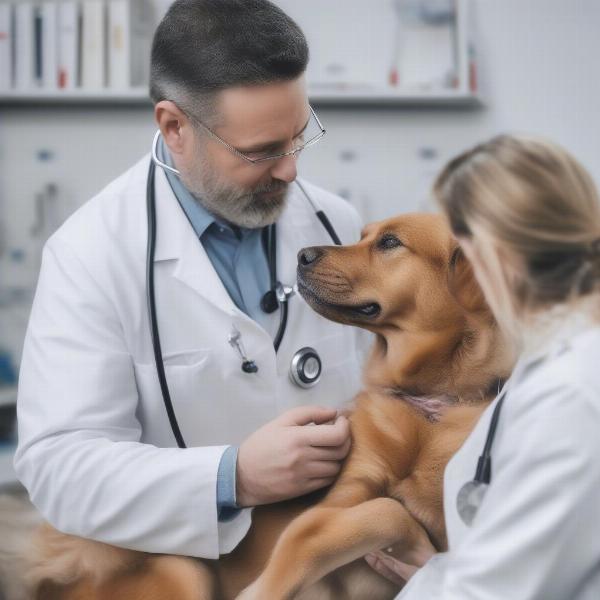Dogs pant, it’s a fact of life. But when your furry friend starts panting excessively at night, it can be concerning. Is it normal? Is something wrong? This article will delve into the common reasons why dogs pant at night, helping you understand whether it’s a simple case of being too warm or a sign of a more serious underlying issue.
Is Nighttime Panting Normal?
Sometimes, a dog panting at night is perfectly normal. Just like us, dogs can get warm during sleep, especially if they have a thick coat or are snuggled under blankets. A little panting helps them regulate their body temperature. However, excessive panting, accompanied by other symptoms like restlessness or pacing, warrants further investigation.
Common Reasons for Nighttime Panting
Temperature and Environment
Dogs don’t sweat like humans, so panting is their primary way of cooling down. If your home is too warm, or your dog’s bed is in a stuffy area, they might pant at night. Ensure good ventilation and a comfortable sleeping temperature to alleviate this. Consider using a cooling mat during warmer months.
Anxiety or Stress
Just like us, dogs can experience anxiety and stress. Nighttime can be particularly challenging for anxious dogs, leading to panting, pacing, whining, and even destructive behavior. Identify potential stressors, like loud noises or changes in routine, and try to minimize them. Creating a calming bedtime routine can also help. If anxiety persists, consult your veterinarian or a certified dog behaviorist.
Pain or Discomfort
Panting can be a sign of pain or discomfort. Arthritis, injuries, or other medical conditions can make it difficult for your dog to get comfortable at night, leading to panting. [restlessness in dogs at night](https://ilmdog.com/restlessness-in-dogs-at night.html) If your dog exhibits other signs of pain, such as limping, whimpering, or changes in appetite, schedule a veterinary checkup immediately.
Medical Conditions
Several medical conditions can cause panting, including heart and respiratory problems, Cushing’s disease, and anemia. senior dog panting a lot If your dog’s panting is persistent, accompanied by other symptoms like coughing, lethargy, or changes in breathing patterns, seek veterinary attention promptly. Early diagnosis and treatment are crucial for managing these conditions.
What to Do if Your Dog is Panting Excessively at Night
First, assess the situation. Is the room too warm? Is your dog anxious? If you can identify and address a simple environmental factor, do so. However, if the panting is severe, persistent, or accompanied by other symptoms, don’t hesitate to contact your veterinarian.
 Veterinarian examining dog
Veterinarian examining dog
“Never underestimate the importance of a veterinary checkup,” says Dr. Emily Carter, DVM. “Panting can be a subtle sign of a serious underlying condition. Early intervention is key.”
Creating a Comfortable Sleeping Environment
A comfortable sleeping environment can significantly reduce nighttime panting. Ensure a cool, well-ventilated area for your dog’s bed. Consider a comfortable, supportive bed that suits your dog’s size and age. A consistent bedtime routine can also help reduce anxiety and promote restful sleep.
“A calming bedtime routine can work wonders for anxious dogs,” adds Dr. Carter. “A gentle massage, a quiet story, or even just some quiet time together can help your dog relax and prepare for sleep.”
Conclusion
While occasional panting at night can be normal, excessive or persistent panting warrants attention. By understanding the potential causes and taking appropriate action, you can help ensure your furry friend enjoys a comfortable and restful night’s sleep. dog pacing and panting Remember, when in doubt, consult your veterinarian.
FAQ
- Is it normal for my dog to pant a little while sleeping? Yes, some panting can be normal, especially if the environment is warm.
- When should I be concerned about my dog’s panting? Be concerned if the panting is excessive, persistent, or accompanied by other symptoms.
- What can I do to help my dog stop panting at night? Ensure a cool, comfortable sleeping environment and address any potential stressors.
- Could panting be a sign of a serious medical condition? Yes, panting can be a symptom of various medical conditions, including heart and respiratory problems.
- Should I take my dog to the vet if they are panting excessively at night? If you are concerned about your dog’s panting, it’s always best to consult your veterinarian.
- Can anxiety cause dogs to pant at night? Yes, anxiety can lead to increased panting, especially at night.
- What are some signs of pain in dogs? Signs of pain can include panting, limping, whimpering, changes in appetite, and restlessness.
ILM Dog is your go-to resource for expert advice on all aspects of dog care, from breed selection and health to training, nutrition, and grooming. We are committed to providing dog owners worldwide with reliable, practical information to help them provide the best possible care for their beloved companions. Whether you’re a new dog owner or a seasoned pro, ILM Dog offers valuable insights and resources to help you navigate every stage of your dog’s life. Contact us at [email protected] or +44 20-3965-8624 for expert guidance on dog care.